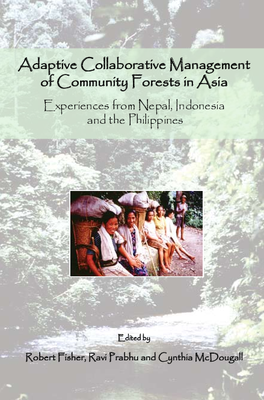Adaptive Collaborative Management of Community Forests in Asia Experiences from Nepal, Indonesia and the Philippines
The easy ‘solutions’ offered by centralised resource management no longer work, and the era of top-down decision making is all but over. Some of the new directions that have been proposed include learning-based approaches in place of set management prescriptions, using a broader range of knowledge (including local and indigenous knowledge), dealing with uncertainty and complexity, and of course the sharing of management power and responsibility. Resource management has become not a search for the optimal solution but an ongoing learning and collaboration process for shared problem solving. Adaptive management is a way of dealing with uncertainty and complexity; collaborative management is about sharing management power and responsibility. Adaptive management and collaborative management have been evolving towards a common ground. Adaptive management, without user collaboration, would become a sterile technocratic process; collaborative management, without a learning loop, eventually withers. In our recent book, Adaptive Co-Management: Collaboration, Learning and Multi-Level Governance (University of British Columbia Press, 2007), we found that time-tested collaborative management necessarily becomes adaptive collaborative management, not only in forestry but in a diversity of resource management areas. For forest-dependent peoples of Southeast Asia and elsewhere, making a living in a rapidly changing, globalised world requires continual learning, adaptation and collaboration. Managing forests in a rapidly changing world also requires a process of deliberate social learning and collaborative vi • Foreword problem solving. The development of flexible, participatory governance systems that can learn from experience and generate knowledge to cope with change is an important mechanism for adaptation and resilience. In a world characterized by unpredictable shocks and stresses, forest users and managers need alternatives and backup options. Social learning helps generate these options, building resilience in linked systems of forests and people. This volume contributes to a deeper understanding of the issues around deliberate social learning and collaboration, with chapters on four Asian cases. The Center for International Forestry Research is a world leader in this area; CIFOR researchers have been investigating adaptive collaborative management at least since 2000. The cases in this book aim to demonstrate what adaptive collaborative management is and how it can be applied in practice. Fikret Berkes Professor and Canada Research Chair in Community-Based Resource Management University of Manitoba
https://biodiversitylinks.org/projects/completed-projects/cbnrm/cbnrm-literature-review-sources/adaptive-collaborative-management-of-community-forests-in-asia-experiences-from-nepal-indonesia-and-the-philippines/view
https://biodiversitylinks.org/projects/completed-projects/cbnrm/cbnrm-literature-review-sources/adaptive-collaborative-management-of-community-forests-in-asia-experiences-from-nepal-indonesia-and-the-philippines/@@download/image/image.png
File
Adaptive Collaborative Management of Community Forests in Asia Experiences from Nepal, Indonesia and the Philippines
Author(s):
Fisher, Robert,
Prabhu, Ravi,
McDougal, Cynthia
Publication Date: 2007
Location: Asia
DOWNLOAD FILE
The easy ‘solutions’ offered by centralised resource management no longer work, and the era of top-down decision making is all but over. Some of the new directions that have been proposed include learning-based approaches in place of set management prescriptions, using a broader range of knowledge (including local and indigenous knowledge), dealing with uncertainty and complexity, and of course the sharing of management power and responsibility. Resource management has become not a search for the optimal solution but an ongoing learning and collaboration process for shared problem solving. Adaptive management is a way of dealing with uncertainty and complexity; collaborative management is about sharing management power and responsibility. Adaptive management and collaborative management have been evolving towards a common ground. Adaptive management, without user collaboration, would become a sterile technocratic process; collaborative management, without a learning loop, eventually withers. In our recent book, Adaptive Co-Management: Collaboration, Learning and Multi-Level Governance (University of British Columbia Press, 2007), we found that time-tested collaborative management necessarily becomes adaptive collaborative management, not only in forestry but in a diversity of resource management areas. For forest-dependent peoples of Southeast Asia and elsewhere, making a living in a rapidly changing, globalised world requires continual learning, adaptation and collaboration. Managing forests in a rapidly changing world also requires a process of deliberate social learning and collaborative vi • Foreword problem solving. The development of flexible, participatory governance systems that can learn from experience and generate knowledge to cope with change is an important mechanism for adaptation and resilience. In a world characterized by unpredictable shocks and stresses, forest users and managers need alternatives and backup options. Social learning helps generate these options, building resilience in linked systems of forests and people. This volume contributes to a deeper understanding of the issues around deliberate social learning and collaboration, with chapters on four Asian cases. The Center for International Forestry Research is a world leader in this area; CIFOR researchers have been investigating adaptive collaborative management at least since 2000. The cases in this book aim to demonstrate what adaptive collaborative management is and how it can be applied in practice. Fikret Berkes Professor and Canada Research Chair in Community-Based Resource Management University of Manitoba



